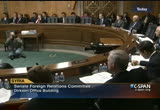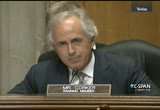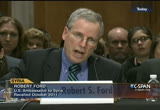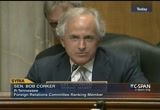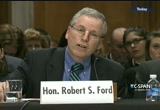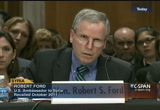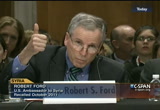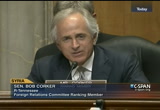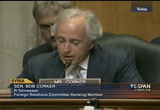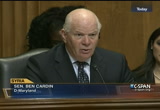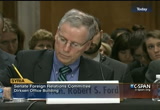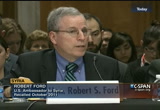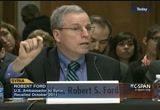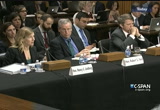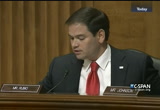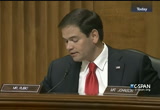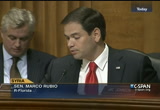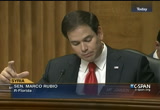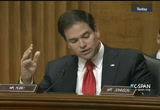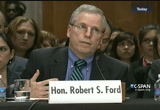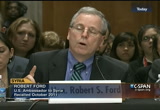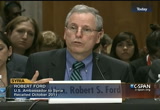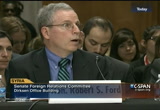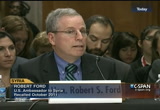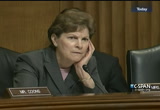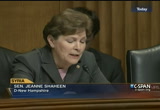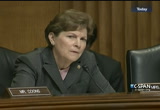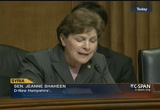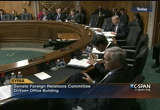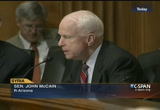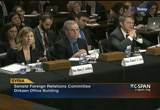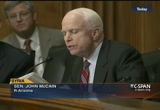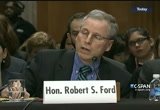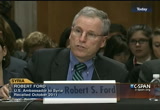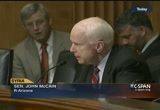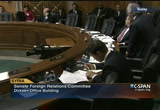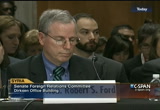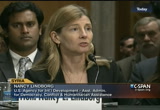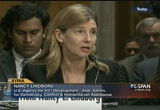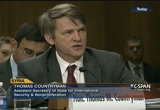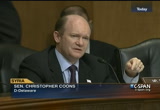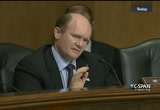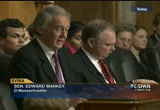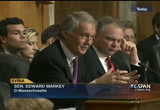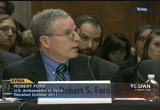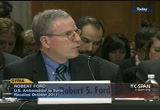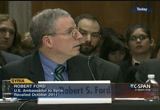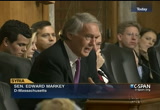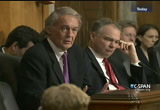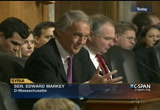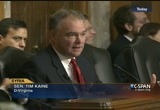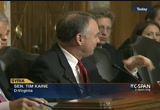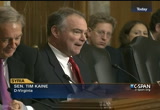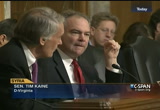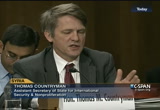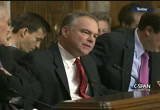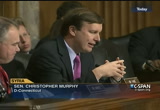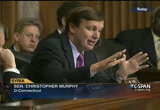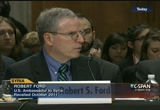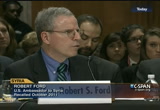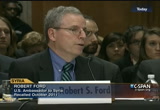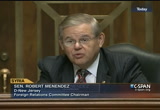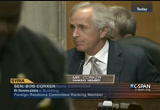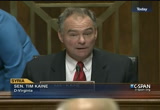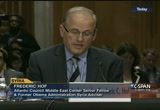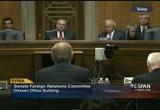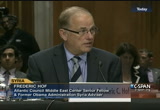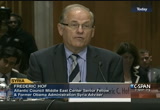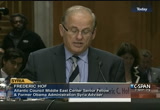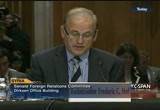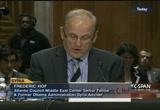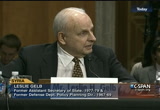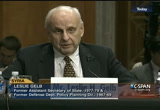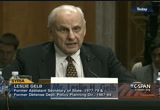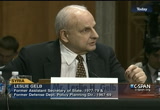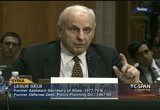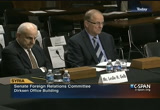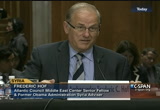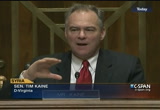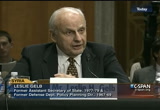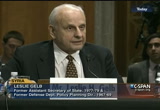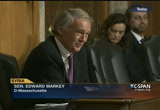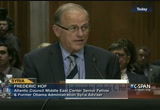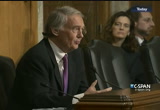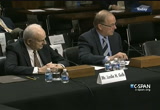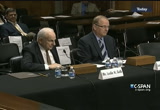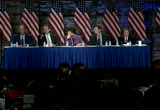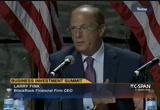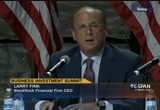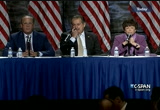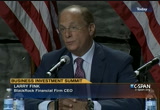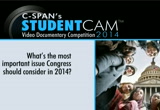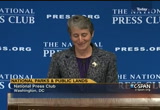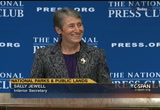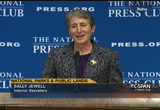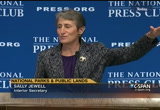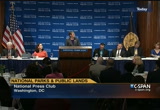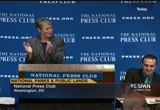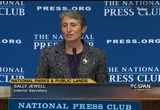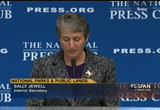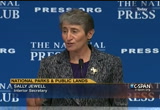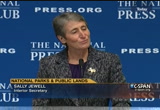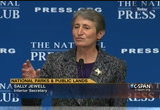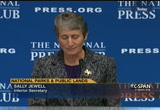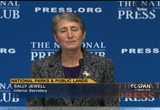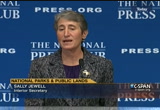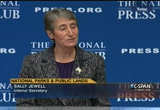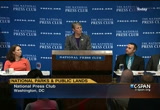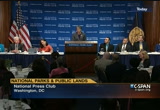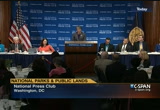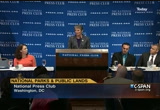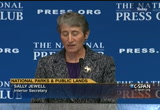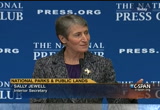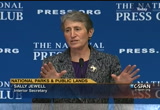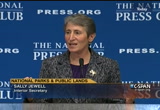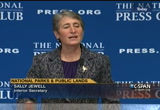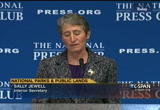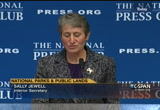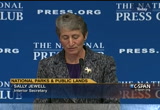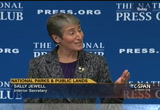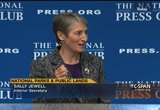tv U.S. House of Representatives CSPAN October 31, 2013 4:00pm-6:01pm EDT
4:00 pm
they are deeply disappointed, senator, that we chose not to use military force. i have heard anguish from people that i have talked to over there. i have had to explain the administration's rationale. to themad to emphasize that our primary goal here is to find a political solution. i am not so concerned about the military force component. what i am concerned about is i would just like for you to tell me that since we have gone through this pursuit with russia, relative to mr. which ian's work, appreciate, is the opposition on the ground faring better or worse since we are now pursuing the destruction of chemical weaponry?
4:01 pm
flex their position on the ground, senator, i'm going to leave aside the morale. the position on the ground has not changed very much. they have made some gains to the north to the south and to the east of aleppo. the opposition has made some gains. but as i said before, neither side in this awful, grinding civil war is able to do a knockout punch right now. one problem that is hampering the opposition is the bitter division among the armed groups. month, al qaeda groups, especially a group ,alled the islamic state actually started fighting with the people that we support that were fighting the regime. those people have been fighting 82-front war among which has
4:02 pm
been -- have been fighting a t war, which has been seriously hampering their efforts. folks.know these some of us have become familiar with these folks in refugee camps after multiple trips. we had a strategy that we were building in early september. administration has been incredibly slow, and obviously, this covert policy that everybody in the world knows about, where we will train folks covertly so we do not have to talk about it in committee settings like this, but basically, we have trained about 1000 folks. our intelligence folks can train 50-100 per month. we had a minor strategy, but basically, do we really have a strategy at all relative to the opposition?
4:03 pm
and building their strength against al qaeda on the ground and against the regime? >> senator, we do. example, we delivered trucks to the people there inside syria. >> they were going to deliver those trucks when i was there in august, and then next week. it is unbelievable. so he -- so you delivered trucks. does he have weaponry? >> he does have lethal weaponry. i'm not here going to talk about anything except what the state department is doing. click the state department is delivering weaponry echoplex i did not say the state department is delivering weaponry -- >> the state department is delivering weaponry? >> i did not say the state department is delivering weaponry. we have delivered trucks of supplies. >> i sat down with him in august
4:04 pm
and those trucks were coming the next week. now you have delivered trucks. are you satisfied with the strategy that we have in syria right now with the opposition? do you feel good about it? when you talk to people on the ground and in these refugee camps, do you feel good about the strategies that we have for these people that we have left out on a limb and told them we would support their efforts against this regime and against al qaeda? do you feel good about what our country is doing with the opposition right now? to allow them to have some kind of say-so in the future of this country? a person on my team in the state department that does not feel frustrated, frustrated by the syrian problem in general. but i have to say, we do provide support. we provide a lot of support. do, butdiscount what we it matters to them. every time i talk to them, he
4:05 pm
thanked us for what they -- what we do. with a like more? of course they would. they would like a lot more from a lot of countries. but for those who are trying to old things together in places like aleppo and elsewhere, just to keep the hospitals running, to keep electricity in the hospitals, to provide clean water, it matters hugely to them. are there greater needs? of course there are. but our resources themselves are not unlimited. we are doing what we can with what we have. the problem itself is tragic. i know people myself who have been killed. it is tragic and we want to help them. ultimately,y, -- syrians must fix this problem and ultimately, it will require them to sit down at a table. the sooner they start, the better.
4:06 pm
but in the meantime, we will keep helping the opposition. >> i think our help to the opposition has been an .mbarrassment and i find it appalling that you would sit here and act as if we are doing the things we said we would do three months ago, six months ago, nine months ago. they must look at us as mother -- as one of the most feckless nations they have ever dealt with. for you to say that these trucks are being delivered today is laughable. these things had been committed months ago. i have to tell you, i respect your care for syria. i really do. i could not be more embarrassed at the way our nation has let people, civilians, down on the ground the way we have. i know that russia is driving this now. what we have really done is turned the future of syria over to russia.
4:07 pm
they have their hands on the steering wheel. i don't know how you could feel good about the humanitarian crisis that is taking place. i don't know how you can feel good about how our partners, how they are feeling about our reliability. but i want to tell you again, i appreciate your concern about the people of syria. i cannot imagine that you can sit here with a straight face about what we have done. i hope at some point, this administration will sit down and develop a strategy not only for syria, but for the region. it appears to me after multiple, multiple trips to my this administration acts on an ad hoc basis, looks for opportunities to slip the news as they most recently did an syria. i hope you will help them to develop a longer-term strategy. ouret me thank all three of witnesses. ambassador, for your service, your distinguished career in-
4:08 pm
depth nomadic service, and all three of you for what you have done. service, andtic all three before you have done. but we have here is a civil war and we have picked the side. i would agree with the ranking member, it has not been clear what our role is with regard to that civil war. although we have picked a side and we are providing help to the opposition. and then there was the use of weapons of mass destruction chemical weapons in which president obama was very clear that we would not tolerate that for my and if necessary, we would use force. this committee supported the president in that decision, that chemical weapons cannot be used without a response from the international community. you are here today to say that you are following up on destroying those -- or removing those chemical weapons. i did not hear any one of you say anything about the
4:09 pm
person who was responsible being held accountable. i hear you say that we will be negotiating between the government and the opposition on a new government. i heard you say that assad will probably not be part of that because the opposition has the veto right. but it seems to me that we are so quiet about holding those foronsible accountable their international criminal actions, and we seem to be timid in raising that subject because we are afraid it makes negotiations more complicated. but if you don't mention them, and we will not get that type of accountability. maybe they will use these weapons -- maybe they will think, we can use these weapons that maybe they will try to take them away from us, but we will survive. they should not get that message. can you reassure americans that our commitment is to make sure that a thought is held -- that
4:10 pm
assad is held accountable and that those who used chemical weapons, that part of our negotiating strategy will be to old them accountable for their criminal actions? senator, we have her. -- stated, repeatedly, that we have repeatedly stated, repeatedly, that regime officials will be held accountable for the august when he first use of chemical weapons in the suburbs of damascus. we specifically highlighted that. and many times i personally and the secretary himself have talked about accountability. they couple of things on that, number one, with the support of congress, we are actually training syrian investigators on how to investigate and develop war crimes dossiers. we are doing that now. are in discussions
4:11 pm
with colleagues at the state department with international what would be the best structure to try these war crimes dossiers that will be developed. we take these actions extremely seriously and we do intend to help syrians hold people the work ofwith international partners. >> will this be a subject on negotiations between the opposition and government? that,ave no doubt of senator, because the opposition will insist upon it. >> will the united states insist upon it? >> senator, we will absolutely support the opposition putting that forward. the united states, senator, is not negotiating. >> i understand that. we are prepared to use our military to stop the use of chemical weapons. are we prepared to use our
4:12 pm
military might to make sure that held who did are responsible for their actions? >> absolutely, and i've already talked about the resources we are deploying to help make that happen. this humanitarian disaster in syria today, one third of their population has been displaced. 2 million are externally displaced. half a million internally displaced. the challenge of getting into serious to help those who are victimized is challenging. what support are we receiving from the international community to help deal with the humanitarian crisis during this civil war? been a massive mobilization of humanitarian assistance. the u.s. is by far the leader. are substantial contributions, especially from from europe.t -- kuwait hosted the u.n. appeal conference last january and has
4:13 pm
itself contributed a little more than $300 million. notably, russia and china have contributed very small amounts. asre is a goal, especially we look at the extraordinary needs that continue to amount -- bring as many people into the financing of this humanitarian effort as possible. >> thank you, mr. chairman. >> senator rubio. >> let me begin before i ask my questions -- i don't want the tone of my questions or direction in any way not to reflect on my admiration for your service to our country. and not only that, where you have shown consistent interest in the syrian people. but we have a chance to ask a question about the strategy. let me begin with something i think i know the answer to.
4:14 pm
you have referred repeatedly how the future of the syrian people belongs to the syrian people. whatou also believe that happens there is in our vital national interest. senator, just the fact that syria has the risk of destabilizing the region and become a base for terrorism, absolutely. >> i just want to make that clear. why do we even care about what is happening in another country? it is not just a civil war. it has implications in the region. in a few moments on the second panel, we will hear from an ambassador who will testify based upon his written testimony that syria on its present course is becoming the worst of all seek -- worst of all conceivable scenarios, a failed state that is divided between assad controlling a portion of the country, kurds controlling a portion near the turks used -- the turkish border, and a vast majority controlled by the
4:15 pm
ahadist who will use it as base of operations for destabilization in a rack, and eventually jordan. would you disagree with that assessment? is that the not -- is that not the short-term to reject free it is headed in? >> i would agree with that statement. but i would like to add something. that is why it is important for countries in the region, for the russians, the chinese and the members of the security council, the permanent five, the united nations -- everybody has to do more. right now, it is going in the worst direction. into an't want to get debate about it, but i'm not sure that the russians care about the destabilizing of syria. -- asay view it at geopolitically advantageous to them. goal here would have been to try to empower non--
4:16 pm
jihadist opposition forces within serious to do two things, never one, have the capacity to drive a thought out of power, whether negotiated or otherwise, and create a functional state to replace him, and never to, to leavewithin syria for these foreign fighters, these jihadist -- and number two, to leave no room within serious for these foreign fighters, these jihadist. us told have required identify who these non-jihadist opposition forces were and then to empower them within the region to do so. i want to again go back to testimony that ambassador hoff will offer. he will point to the fact that it took us until december, 2012 to finally recognize the syrian national coalition as legitimate representative of the syrian people. and even after that, two things happened. one, the united states and united nations continue to recognize the assad led government, which had an enormously bad humanitarian
4:17 pm
consequence for the syrian people. many syrianso, stuck with the devil they know having been denied an alternative that they could see and evaluate. lest we think this is only limited to syria, i want to go to the testimony we will hear in a moment from dr. bell among who will testify that yet another major reason for fall -- for policy failure is a lack of another major -- reason for policy failure is a lack of a coherent strategy. they do not know what the policy is toward the region. they say it is vague and ever- changing. you say in your testimony that the conflict in syria has fostered an environment that grows with extremism and hide a link groups are working to exploit the situation for their
4:18 pm
benefit. -- and al qaeda-linked groups are working to exploit the situation for their benefit. we need to weigh in on behalf of those who promote tolerance and freedom. i take it that you're saying that is by not empowering these folks, you are actually de facto empowering the people who do not promote freedom. here is my question. sooner?'t we do it in foreign policy, doing the right thing is not the only thing. you also have to do the right thing at the right time. why did it take so long to reach this conclusion? and now we find ourselves in a situation where fighting on behalf of those who promote freedom and liberty and tolerance is harder than ever and may be impossible. why did we do this, but sooner? -- why did we not do this, but sooner? >> the syrian opposition from the beginning was atomized. that is how it survived the
4:19 pm
regime's oppression. there was no national leadership. it is very hard to build up something that itself is still very incoherent. it took a long time for the opposition coalition to come together. you are right, we only recognized it in december, 2012. but it was only formed in mid- november. we recognized it as the legitimate representative three weeks after it was established. we have reduced the syrian to the officer. and frankly, that officer is there because a lot of the syrian americans here want a syrian task force and he is able to issue them. if i may continue, though, about the it ministration's policy, with respect to the opposition it is still a problem in terms
4:20 pm
of the divisions. they fight each other sometimes with the same vigor that they fight the regime. even politically. it took an enormous amount of listening from us -- and i was there personally. as well as some of the other members of this group of 11. opposition this coalition of the kurds, to bring in an armed opposition so that they would reflect the people fighting on the ground, and to bring in these local councils that are referred to, so that it is not purely an expatriate organization. they themselves only moved at a syrian speed. i wished they would go faster. our assistance, as i said, is not unlimited. do they need more? help and we are trying to them generate resources from other countries as well. in a sense, it is a multilateral effort. we have helped organize the
4:21 pm
countries that provide assistance. >> senator shaheen. >> thank you, mr. chairman. thank you for your service and for being here today. there has been, a lot of discussion so far about what our strategy is in syria. and you have laid out what you believe that to be. can you talk about how we are judging whether we are being successful or not, and at what point we may determine the strategy is either successful or not successful and where we may need to make a change? likes senator, we think that the discretion of the chemical weapons is a huge success, if it is carried out fully.
4:22 pm
that was a core u.s. national security interest. i remember when i came to this committee as the nominee to be ambassador three years ago, we talked about those chemical weapons. that is a success. can i say that our efforts to create a political solution or to contain the civil war are a cisco has -- are a success? know, we are still working on it very hard, but the situation in the country is still deteriorating. this tot see a way for be solved militarily in a community where they think it is existential, where they think if they surrender, they will be murdered. political setld a of agreements between communities, otherwise the fighting goes on indefinitely. >> to what extent are our efforts with the london 11, as
4:23 pm
you say, actually having an impact? are we coordinating closely with others who are interested in what is happening in syria? >> senator, when i compare it to 14, 15 months ago, it is a lot at her. there is better coordination and assistance flows to the political opposition and military opposition. it is better, but not perfect. there could be better coordination still, frankly. >> and how much gleeful assistance do we still think is being provided by the russians? hal assistance do we still think is being provided by the russians? >> i have never seen an estimate of the dollar value of it, but i
4:24 pm
can say that it is substantial, that it has increased from a year ago. there are more deliveries. and in some cases, they are militarily extremely significant. for example, the general was telling me about how these refurbished syrian air force jets -- he said they don't have many, but the ones they have when they are refurbished make a huge difference. helpnk the russians would everyone get to the negotiating table faster if they would stop these deliveries. >> i'm sure there are efforts underway at the u.n. to try to address this, and in bilateral discussions. is there more that we could be doing? are there more international partners that we can bring to bear to try to address this? who are they and what are they? there is no real effort at
4:25 pm
the united nations that i am aware of. >> should there be? >> i don't think the russians are going to pay much attention to recommendations from the u.n. but i can tell you that we have had, including at the level of the secretary, we have had a lot of discussions with the russians. if i can take the time to share a quick story, working with some members of the london 11 able tos, we were actually turn back a russian delivery. we convinced an insurance company to withdraw the insurance coverage for the ship delivering it. but that is a rare success, senator, frankly. it would be great if we could make better progress with the russians. the russian deliveries have become more significant, probably more significant than what iran provides in terms of military assistance.
4:26 pm
corp. -- senator corker's statement of concern about the russians having their hands on the steering wheel to syria. there is something to that, but what is not notice -- not noted is the cost to russians with the rest of the arab world and the entire region when they give their unswerving support to the syrian regime. >> thank you. mr. chairman, i am over my time to my but may i ask one more question? for mifflinburg. you talked about the vaccination challenges as we are looking at the potential outbreak. -- the potential polio outbreak. is there more we should be doing before it extends across the middle east? does that have implications of health and safety for people throughout the region?
4:27 pm
>> there is an actual outbreak. that, as you have probably seen in the papers, each of those cases represents the possibility of another 2000 cases. who has already mounted a campaign to vaccinate inside syria as well as the region. they are driving forward. the key will be to ensure that all parties grant access to those workers who are administering the vaccine. i understand that. i would hope we are doing everything we can to pressure the russians, they rainy and, and everyone else in the middle iranians,pport -- the and everyone else in the middle east to support this campaign. >> absolutely. >> i thank you, mr. chairman. i think the witnesses, and that's are -- i thank the
4:28 pm
witnesses. ambassador ford, i would like to point out that you articulated goals, not a strategy. to call the categorizing and removal of chemical weapons a be. success, that may but we are now in the orwellian russians arere the and rna replaceable part of the scenario in identifying and removing -- and are any replaceable part of the scenario in identifying and removing chemical weapons and they are replacing them with conventional weapons. as someone pointed out, a mother watching her child starve to comfortingt really that the child has not been killed by a chemical weapon. your continued reliance on the
4:29 pm
find just such history of russian behavior that it is absolutely remarkable. you continue to call this a civil war. this is not a civil war anymore. it is a regional conflict. it has spread to a rack. we now have al qaeda -- it has spread to iraq. we now have al qaeda insurgents in iraq. has 5000 troops there. for you to describe this as a civil war is a gross distortion of the facts, which again, makes many of us question your because youstrategy do not describe the realities on the ground. spokesperson for the obama administration is mr. ignatius.
4:30 pm
he writes this morning in the " with the post, more restrained approach in syria, obama has decided to limit the u.s. effort there to chemical weapons and providing for refugees who may experience massive suffering and loss of life this winter, and catalyzing a political process to replace president bashar al-assad. what obama is not prepared to do is topple assad militarily. united states will continue to provide covert aid to the rebels, the goal is to strengthen their negotiations and an eventual peace conference , not military victory. then he goes on to say, but
4:31 pm
let's be honest, this is basically a formula for stalemate in syria with a growthed carnage and not there. did mr. ignatius adequately describe the obama administration's strategy? thinkator, we do not there is a military solution to the conflict in syria. if basharbelieve that al-assad has the military vantage on the ground that there is a solution? >> i don't think bashar al-assad can win militarily either. believe he has the advantage on the ground now? >> only in a few places like up around aleppo. he has a disadvantage on the ground in the east and the south and other places. >> is killing remained unchecked, ambassador ford.
4:32 pm
come on, it seems that is a satisfactory outcome to you. be fact is, he was about to toppled over a year ago, and then hezbollah came in and the russians stepped up their efforts. and then the revolutionary guard intervened in what you call "a thel war" and he turned tide. and he continues to maintain his position of power and slaughtering innocent civilians. and you are relying on the geneva conference, right? i would agree with much of what you said in terms of the balance shifting against him and the intervention of hezbollah helping the regime. more and more, the regime is dependent on foreign manpower because of the manpower shortage, as i mentioned. but our goal ultimately is to get teary and communities who are afraid of each other to somehow come to a political agreement. i cannot emphasize that enough. isil the community that
4:33 pm
backing assad feels they will not be slaughtered, they will keep fighting. that is why i talked about the need, while we support the moderates and the opposition, and also to put forward political proposals. now is the time. >> again, realities of warfare are that someone believes they can stay in power, which obviously assad can, and they are not ready to negotiate their departure. that is a fundamental principle. for you to think otherwise is bizarre. let me say again, the reason why the saudi's have divorced themselves from the united states of america is because of what you just articulated to senator corker, trucks. that is a great thing, trucks. as shiploads of weapons come in from the russians. as planeload after planeload
4:34 pm
providing all kinds of lethal weapons, and we are proud of the fact that we gave them trucks. i am now at a position, tragically, where i will have to rely on the saudi's to provide them with the weapons they need because it is patently obvious that the united states of america is not going to do so, and in the testimony of the witnesses who follow you, we are seeing an endless slaughter and this is a shameful chapter in american history. thank you for holding this critical hearing. and i want to thank our panel witnesses. there are many questions that remain with regard to our path forward in syria. while i am these that we were provide for the need
4:35 pm
without the use of force, we cannot forget that a thought has ordered 100,000 of his own people. not only through chemical weapons that killed 1500 innocents earlier this year, but through the medieval warfare that was described in your testimony. i am pleased that some progress has been made in the removal of chemical weapons and that we are in the process of exhausting diplomatic alternatives to military force, but i find it jarring at the same time that six weeks ago, we sat in the same room and approved a strong policy, directed in part by president obama, a holding assad accountable for his crimes. but today we do not seem to be making progress on a number of those essential shared commitments. let me start, if i could, with the assistant administrator lindell. when i visited earlier this year in jordan, they expressed
4:36 pm
extreme frustration, anger, disappointment about the delays in the promised delivery of u.s. assistance and support. in your testimony, you have documented some of the ways we have delivered a significant amount of support all across the country. will you say a little more about what has been done to address logjams, ensuring deliveries to syrian's, but also to refugees in jordan and in turkey, and also to mitigate this hugely destabilizing impact to the region and to those vital american allies? >> there has been a huge amount -- international focus looking at how to address this crippling burden of the refugees in jordan and levin on. -- lebanon. one of the challenges that many are not in camps, but living in families -- with families and in host communities where vital interests are stressed. shift a lot ofo
4:37 pm
our development programs in jordan, particularly in cooperation with the government of jordan, so that there is increased development within communities that are having stressed water, infrastructure, electrical systems, schools, clinics. we have something called the complex crisis fund that is working with communities in the north in particular to increase access to clean drinking water and to clean drinking water and two drinking water for their animals. is happening across the international donor community and there has been a lot of work done to create what is called a -- to create a comprehensive the sideso get working together to understand this is a severe and protracted crisis. we need to think about how to maximize our resources. >> if you will forgive me, we have very short time. i will welcome more detail.
4:38 pm
i want tocountrymen, thank you for your work and your testimony. have a high level of concern as regard has blood and this terrorist organization that you and others have spoken to, that is a threat to israel and targeted americans in the past. ofthere any inference transfer of chemical weapons to hezbollah? what you think is the risk as this conflict continues? >> there is no such credible evidence. it is one of the things that drives u.s. russian cooperation on this particular topic, that they share our concern that the longer these chemicals hang around syria, the greater the risk they could be diverted to extremist groups of any complexion, inside or outside syria. >> thank you. --assador ford, if i might
4:39 pm
one of my concerns about the path that we have taken is a very deep sense of abandonment by the syrian opposition. and the syrian people more broadly. quote from your testimony. they fundamentally do not trust assad regime and are concerned that external parties will cut a deal at the opposition's expense. while i recognize the challenges that you have spoken to at how has this frustration and internal division manifested itself in terms of ongoing radicalization on the ground? what do you see as its trajectory? and how would you provide vital support on the ground for the opposition, the vetted opposition, in a constructive way that pushes toward negotiations, and how are we dealing with a significant sense of abandonment on the part of
4:40 pm
the steering opposition by our recent actions? really important, senator, in order to undercut recruitment by groups like al qaeda for the syrians themselves to not feel abandoned. vital. that is we, ourselves, on both a political level -- for example, the communiqué that we issued last week out of london with the other countries ministers was actually very well received. andnderlines our support said that assad thought had no role in a transition government. it said that the regime was responsible. politically, they got a good message out of that. it is not the first time, but it was needed then, because of their disappointment about -- >> this is the statement that body "when a transitional is established, assad and those with blood on their hands will have no role in that."
4:41 pm
x correct. >> can we deliver on that? day, can, senator, one along the lines of the geneva communiqué, we can solidly defend the opposition's right to whoever and whatever goes into that transitional government. and as long as the opposition does not want assad and they veto him, we will back them up. >> i'm going to have to move forward. i'm sure we will have the ambassador available to you. has deferredcain to senator markey. service.you for your you have very tough jobs. i think we all know that. think that we have to approach all of this with a lot of humility, given what we have learned after we intervened in afghanistan,a, and
4:42 pm
and after what we have seen go on in egypt. we should have a little humility in the united states in terms of our ability to control events on the ground from this country that allows us to, basically in eye watering detail move the pieces around in another country. notwithstanding our concern for the humanitarian practice and our desire to see assad be removed. you, mr. ford, if you could give us a little bit of an of the al qaeda forces iraq, some a rack -- of these other extremist groups, the moves they are making and where they are making it, and where the support is coming from. so that we can understand the nature of the threat that we see
4:43 pm
to the moderates being successful. >> first, senator, i appreciate your understanding about the amount of resources that we put in and our ability to control everything. i think that is exactly right. ultimately, this is a syrian conflict, not an american conflict. qaeda, they to al have been very assiduous to take control of borders, senator markey. and for example, their control of the borders delayed our deliveries of aid into serious. there was some frustration expression -- expressed about because wey of aid had to recapture border points so we could get aid back into them. ony have mainly focused building up islamic courts and
4:44 pm
structures of governance well behind the front lines of the fight of the regime. whethernd, senator, intentionally or not, they are almost acting as allies of the regime. problem for our friends in the moderate opposition. the nature of their support comes mostly -- not entirely -- but mostly inside syria. for example, they have captured oil wells in eastern syria and they sell the oil. in this -- in a sense, they are becoming more and more self financed, which is a problem. because now we will have to work with our friends, such as turkey and jordan, to shut off the oil sales that they are trying to do . it is literally like tanker trucks. >> are working on this right now? >> yes, we have had to. but they also rely on things like extortion. they run rackets.
4:45 pm
that is why they are now beginning to generate an anti- qaeda-- an anti-al reaction on the street, which is positive. >> who funded these groups initially in order for them to have the resources to take over the oil wells, to take over the cities, which are now terrorizing the more moderate elements of the syrian people? who finance them? have we dealt with the external resources that have been supplied in order to with theh these goals most extreme groups? >> early on when they did not have control of oil wells and borders, they were getting financing from outside of syria through several private networks never funneling money from laces like the gulf, but even places
4:46 pm
in europe. places andu name the countries? >> if i say gulf in an open -- and so wetor, have discussions with those countries as well. >> and the iranians are still providing massive support for the syrian government. even as we are negotiating with them on their nuclear weapons program, they are simultaneously undermining our efforts to bring peace and resolution to the war in syria. , in the past week it has been reported that iran wants to purchase a new nuclear power plants. how much would that complicate our ability to ever get a resolution if they ever did plants inw power iran? >> the iranian government and
4:47 pm
the russian federation have long been in a discussion about expansion of nuclear power in iran, russian technology in iran. they make announcements about it regularly. i think it is unlikely to proceed very far very fast until the one that has been on the verge of opening for many years actually does begin to function. the negotiation of the five plus is complex enough as it is. but i do not believe that an expansion of nuclear power, or an intention to expand that will happen much later, really adds to the nature of the negotiation we are in right now. >> may i just say that iran is a big part of the whole puzzle because of assad and hezbollah. there it is as a separate agenda
4:48 pm
contrary to our interests. that six y thankful plants six new power were not completed before he felt, or the ayatollah would have those in his control. let me just repeat that it is still there plan to use nuclear power plant as a cover for a nuclear weapons program. we have to deal with it now rather than later. we have to make it part of a program that says you do not have an inherent right to these nuclear power plants and we're going to block it. if we don't, we will revisit this issue in another 20 years when those programs get converted to another nuclear weapon with the next regime. it is very important for us to look down the line and understand what the iranians have as their goal to create hegemony command assad is still part of that. i don't think that article four of the nonproliferation treaty
4:49 pm
-- anylonger valley longer valid in terms of the iranians and their ability to qualify for civilian nuclear programs in the future. i will work very hard to ensure that those eight nuclear power plants are never constructed, and no one who is in alliance with us is ever allowed to transfer those technologies to them under the guise of the iaea. >> an observation and a couple of questions. much comment around the table about frustration, what our strategy is, the frustration you feel doing this work, the disappointment that members of the opposition felt when we did not undertake military action. we are all grappling with this frustration and challenge and potential loss of u.s. prestige in the area over this and other
4:50 pm
items. i am wrestling with at the root of this having voted for the authorization with many members of this committee, and it is a vote i would willingly cast ever --morrow if they and i felt that the crossing of the line of using chemical weapons on civilians necessitated that. i felt we created an opening to have a dialogue with russia about chemical weapons. weaponsod that these are being destroyed. that the site has been is good.d but we still see a lot of bad and we are still wrestling with it. still wrestling with one thing. even as much as an obvious good as it is to get rid of the chemical weapons, the american public was not really into the mission. we were into the mission. from what i was hearing from my constituents they were telling me, we don't want to do this. describedort had been
4:51 pm
when we met in august that we are doing this now because of chemical weapons, but to change even ae away from murderous dictator like assad, i think the population would have been even more overwhelmingly the american public saying, we don't want to do this. there is a fatigue that the american public is feeling now about the limits of our efforts in this part of the world. we havemarkey mentioned had hubris and now we are feeling the effect of the outcomes. one issue we are grappling with, and i hope as a commitment when there is a time where there is less back-and-forth with witnesses, we can talk to each iser about what our public telling us. and again, even without public feeling, i would vote for that authorization tomorrow because i think crossing the line on using chemical weapons against civilians has to have a consequence. but the notion of being involved
4:52 pm
ofh aid and the notion shifting to a fragmented opposition, there is a reason there is opposition to it. is of the reasons is there our public telling us not to do it. whether that causes us to lose prestige or abroad, that is what our public is saying to us. we either have to make the case differently, explain mistakes in a different way, or grapple with what it means that our public after 12 years of war in the general real estate is now feeling fatigued about it. those are tough questions. i don't have answers to them. i am really struggling with them here. are -- werean, you specific sites. you may have addressed this when i was out of the room. i want to come back to it a little bit. of 23cw has looked at 21 and might get to the other two. i'm assuming that we have intel
4:53 pm
about additional sites that were not on the inventory and this is information we share with the opcw. that we are trying to get them as much information as we can to expand the sites that are reviewed. talk to me a little bit about what we share to them -- with them and how we follow-up with the information we give them about the insufficiency of the inventory. >> i think we share information appropriately with the opcw. it is a cooperative process. let me start here, which is to say that we have received only theonday of this week comprehensive declaration by syria of its holdings. it is over 700 pages. it is quite detailed. we are assessing him now and there will be a time at which we will have an assessment of the gaps in that document, good if rent isis --
4:54 pm
between what is clear and what --know that we can differences between what is clear but we know that we can discuss in a closed session. have the tools to reconcile any gaps, any discrepancies. part of it may have a simple explanation. for example, opcw in its statement yesterday refers to 23 sites, but also refers to 41 facilities. and covering differences in definition between sites and facilities is part of the answer. i don't want to speculate on what the rest of the answer is, only to emphasize we have the tools, the resources to resolve and we will.nces, >> one brief additional, if i may. does the united states have confidence in the opcw in their technical capacity, their independence, and their object id? >> in their technical capacity
4:55 pm
and objectivity, absolutely. they have done a wonderful job in a difficult environment so far and we salute the organizations and the inspectors of many different nationalities who have done that job. >> great, thank you. >> thank you all for being here. i'm sorry missed a portion of the hearing. i had another one around around the corner. -- right around the corner. ambassador, i know you spent some time already talking about the infighting that is currently happening within the rebel group. we had a lot of conversation reauthorization, about the influence of extremist groups within that coalition, some of which as it turns out had come from people that were partially on the payroll of some of those opposition groups. i know you have touched on this a bit, but having just come from
4:56 pm
a conference in africa in which we were seeing some pretty unbelievable numbers of foreign fighters coming in from europe and some pretty fierce competition amongst rebel groups to recruit those foreign , even more dangerous mistrustme then gelato misra itself,al can you talk about the fighters thesekilled between extremist forces. these groups and their competitors bringing in foreign fighters. one of the benefits is that we pretty well because they spend so much time touting their success on twitter and elsewhere that we have a pretty
4:57 pm
good idea of who is going where, but it suggests that the fractures within the opposition are not just about mainstream versus extremist groups. >> senator, you are absolutely right. there were actually two al qaeda groups in syria. there was the one we designated as a foreign terrorist organization affiliated with al qaeda in iraq last year. and now in the last seven months hase islamist state appeared with a separate entity with more foreign fighters than the first had. has more syrian, but is connected to al qaeda and the al qaeda leadership. this second group has direct ties out of iraq. they are fighting each other in ,ome places in northern syria
4:58 pm
and also in the northeastern city of raka. just to make the battlefield more complicated, there are tactical alliances between the free syrian army and the misra against the islamic state. and he gets more complicated because your kurdish militias fighting alongside arab secular glitches. it becomes quite hodgepodge. month, we have started to see some efforts by to reuniteda groups and re-centralize. i don't know where it is going, but it was there two months ago. tofact, in my next trip out the region, that is a question i will be looking at in some detail.
4:59 pm
>> it is his desire on behalf of a lot of evil on this committee to have -- it is the desire on behalf of a lot of people on this committee to weigh in to help the non-a stream if -- non- extremist elements when the opposition. how does the extremist wing of the opposition either help or hinder our efforts or other's efforts to win the battle within the opposition for who sits at the negotiating table ultimately? >> in my last trip out to the region, i had a number of northgs with groups in and northwestern syria. i can tell you, these were the real commanders. we met them in turkey. they were happy to get tactical level help wherever they could get it.
5:00 pm
they were very upfront about that. misra unitsa fighting on the street from then, they were happy to take that help. we do not want people that we support to be in turn in bed becomes a-- and this challenge for us, in terms of directing our assistance. >> thank you. let me thank this panel, i know several of us, senator koons, myself, would like to engage in a little bit further, in another setting, and we want to pursue some of those questions, and a classified settings. thanks to all of you. half, call up ambassador
5:01 pm
and mr. -- to the next panel. let mewe call them up, say that i want to apologize for my need to go to the senate floor. i have a new colic from new jersey who is about to be sworn in, and i need to be there for that, but i have read your appreciate,nd i maybe i will call you if you are so gracious as to give me all your time. -- give me some of your time. >> my understanding is that we have some outstanding witnesses, to listen to their testimony and then adjourn the meeting, and ask questions. is this acceptable? >> with that, let me ask senator haynes, who was gracious enough to -- gracious enough to give the remainder of his time.
5:02 pm
>> thank you to panel number two. this is a gift to us, and i'm sorry there is so much turmoil, but this is positive to be swearing in a new senator. that is why many members -- the written testimony is superb, so we do well with ambassador half, gelb, theand lesie president of the council on foreign relations. i will wait until you finish those questions until i
5:03 pm
determine estimate of us need to go to the floor. corker, thank you for that information. iam delighted that you think can say something on your deliberations for what is surely a problem, this problem of syria. bit, inompress things a the interest of time. the chemical weapons framework agreement recently arrived at this and was blessed by the united nations security council, this is most definitely a good thing. we have news this morning that syria has beaten the deadline, for the destruction of its production facilities, much
5:04 pm
clark's problem at its root is not an arms control problem. chemicals are the tip of a very deep and deadly iceberg. surely, if left unattended, kill all attempts to path to aolitical negotiated settlement to this problem. it is a deliberate systematic policy and practice of the assad regime. they are targeting civilians artillery. rockets and aircraft and missiles. murder, mayhem, terror. of ther the words independent international commission of inquiry reporting to the human rights council
5:05 pm
after the atrocities of august 21. government and pro-government forces have continued to conduct widespread attacks on the civilian population. murder, torture, rape. they have laid siege to neighborhoods and subjected them to indiscriminate shelling. government forces have committed gross violations of human rights. hostagetaking, murder, execution without due process. this independent investigation did not give a free pass to jihadist. the commission clearly
5:06 pm
5:07 pm
course -- our first course is rapidly becoming somalia. the assad regime is consolidating itself in western syria. terrorists, some affiliated with al qaeda, have been planting themselves in the east. the administration is trying to jumpstart a diplomatic process. it will preempt this worst of all worlds and area. yet the obstacles are very daunting. if it develops this way, a solution would be to replace the assad regime with a governing body that would exercise full executive power in area for a. of time -- the word of time -- period of time.
5:08 pm
on theuld be negotiated basis of mutual and sent. in theparticipating exercise of full executive power would have to be accepted by both sides. the regime, however, has made it clear in public statements that the person, the position, the prerogative of bashar al-assad is not up for discussion. the syrian national coalition, which would lead an opposition delegation, is undecided whether or not to attend. mr. chairman, in the interest of time, let me stick to my bottom line. we should not avert our gaze from the humanitarian catastrophe. we are victimizing millions of syrians and harming their neighbors full top -- neighbors.
5:09 pm
mr. assad seems to of concluded that he can do anything he likes provided he does it without chemicals will talk -- without chemicals. his principal ally seem not to be disturbed by his military concentration on civilian populations. suspect,regrettably political transition will not be on the table in any meaningful , then oure soon diplomatic effort, all of it, has to focus on persuading tehran and moscow to get their client out of the business of war crimes and crimes against humanity. if we want there to be a civilized alternative to this access of codependency, the allies, wee and it's
5:10 pm
will have to be more serious about overseeing the process of who gets what. inside syria from external sources. >> thank you, ambassador. >> i will do my best to be brief. effort to makey sense out of the we are doing in syria is to have a serious middle east strategy. we do not have it. i just talk to the leaders of the nations in the area and you will see that they are confused and dismayed. their willingness to help us on syria, to follow our lead on
5:11 pm
syria, will depend in good part on all getting our act together. especially in terms of dealing with iran, iraq, arab-israeli negotiations. these things fit together in the real world. as far syria itself is concerned, we do have no strategy. i think all of you touched on that point very well. wanting to get rid of assad. we did not take any effort, either militarily or diplomatically to get rid of him. we drew red lines and then we did not do anything about them. we walked away from them. where it in a position seems we are just going to let this worker gone. there will be terrible consequences.
5:12 pm
well the horrors of the. what i would like to do is get you to think about another possibility. one that can some promise in some shape or form. that is this. think we can supply rebels,rms to the good the sunni moderate rebels, the secular rebels, for them to prevail. that some added to kind of american bombing presence which our military does not want and which would be very costly indeed, and we do not know how effective it would be, even then i do not think there be a military solution. the russians, the iranians, and others would support assad regime.
5:13 pm
we will have a stalemate. it will be a more horrific level for the people of the region. do is this. i would focus on two things. to, what is the real threat the united states? we must focus hard and relentlessly on that issue. ease --er is, the jihad jihad ease -- jihadis. us, are the real enemy to to the russians who fear the sunni, al qaeda radicals. enemies toe irradiance, the iraqi regime. iranians, the iraqi regime, and to the sunnis who are seeking to overthrow them. they're the worst thing that could happen -- a takeover by
5:14 pm
.he islamist extremists that provide the basis over time boths to cajole and push the regime and are sunni moderate friends into some sort of operating alliance. or some sort of cooperation against the jihad ease -- jihadists. there is a real basis for it. feelee with all of you who that thought must go. it is very important. but people need to be protected. you will not be cooperation from tehran or from russia or any these other countries unless you do protect people. threatg on the real allows us to focus on military
5:15 pm
aid and our diplomacy. if we do not try to do something like that, the only result we will see if more fighting and killing. more horrific suffering. syrian people and their neighbors. thank you. >> thank you. let's check with the staff on the boat. starting right now, it will be a 15 minute vote. i want to ask a couple of questions. we will depart and we will leave the record open for questions by committee members until 5:00 tomorrow. the statement that the ambassador made earlier was that we had theent time, ability to deliver a knockout punch. i would like each of your opinions about that event.
5:16 pm
senator, i think the ambassador was exactly correct. this point, -- at you do not have a civil war in the sense of much going on in terms of units firing and maneuvering. this so-called civil war looks nothing like, pardon the expression, marching on richmond. >> that is sensitive where i come from. [laughter] seeing is are really the primary aspects of the so- called combat. weaponry,me standoff alltel arena, aircraft, rockets, missiles. they are pounding residential areas. they either cannot take your ground forces or have chosen not to take. you really do not have much in the way of a fluid situation.
5:17 pm
>> if the chemical weapons were in existence and could be used, that would be a knockout punch. at least the removal of the chemical weapons took a knockout punch away from the assad regime. >> i think senator, the chemicals were running organ subset -- important subset of the terror aspect here. we have to keep in mind the chemical weapons, as they are, accountin in the end are a tiny fraction of the deaths and injuries. >> the idea you put on the table about organizing in civil, what with that idea -- extend that idea to how we should be positioning if that were cold. how should we position our efforts with respect to the restart of series geneva discussions to mark
5:18 pm
>> i do not think there'll be a serious restart of geneva discussions. a strategy that assumes that the geneva discussions will be a professional at best. they will be window dressing. >> i do. you have to begin to betray -- portraying the sunni moderates that we want to support and others who are being killed, they would be slaughtered to. we need to come up with a kind of solution for them. , a federalake place system. then senator joe biden and i will remember the federal system for iraq is the only way to prevent national slaughter there. each of theset communities basically run their own affairs. within the united states.
5:19 pm
we solve their own problem, which needed a federal solution. we need to put that forward to them. we need to explain that is the only way for them to escape the continuing stalemate and horror of the war. >> let me see if the senator has questions. >> if you could expand a little bit more on iran and russia and what you would propose that we do in order to extract the kind of actions that you believe are necessary to us to bring us thought to the table. >> good to see you. i talked to the russians and the iranians about this. i think they're quite sympathetic to the idea. they have not agreed to by any means. it suits their interests. to do something in the
5:20 pm
end that protects them and their allies. they are not foolish. they see down the line that assad is not going to be able to stay in power. they want enough protection for them. this presents somewhat of an answer for them. we need to have this over. we need to talk to them of that strategy in mind. you cannot say, hey, let's have a geneva conference. it will not work. >> if i may, the administration toicials did not want us specifically call out saudi arabia and other nations full we just want to call them the gulf states. do either of you feel comfortable talking about that individual states by name in terms of what we should be asking from them in terms of reducing the amount of support
5:21 pm
that is going to radical groups? >> absolutely. >> can you name the countries? but saudi arabia and qatar mainly. there are other places as well. those are the countries who look to us for general protection in the region. that we havee really leaned on them. we should. master? >> mr. ambassador? >> this is not a silver bullet. it is not a panacea. it will be hard to do. i believe the united states has to insert itself as the overall supervisor of who gets what in terms of x journal military intotance, going
5:22 pm
opposition groups in syria. in order for us to do that effectively, my sense is, and i realized their reservations about this, we have to have some skin in the game. i know there are departments and agencies of the united states government that have spent a lot of time identifying elements inside of syria that we want to support. i believe that we have, from the saudi's and the qataris, agreement in principle. the problem is, we need to be out there, in charge of what is happening. >> can we be in charge of we are an increase in lethal weaponry? >> i do not think we can all stop -- we can.
5:23 pm
we need to scale this up and become serious. >> i do not want to mess up your 30 year perfect voting record as a member of congress. >> i have cast the largest amount of both. it was perfect in the senate, not in the house. if we do dramatically increase our military, what would the response be from the saudis? from the russians and others? why does that give leadership role with them. rather than reconciliation? i think the practical problem we face right now senator, it is that people who are syrian nationals, people who are dedicated to the idea of a nonsectarian government of
5:24 pm
citizenship in the future, they are the ones who are finding themselves squeezed out of the picture. gulf andoney from the are funding al qaeda related groups. they are flush with weapons. the regime on the other side is being supplied lavishly by both russia and iran. the people in the middle, the people who stand for principles that everyone in the room would be comfortable with are not getting what they need. >> you may have the final word and then we will adjourn. isi do not think the answer a lot more arms. we should be putting some arms and there. the way we can leave and take to haveour interests is
5:25 pm
a strategy that makes sense to the countries in the area. so they will go along with it. they will not go along with it simply because we are providing more arms. >> thank you both. the record will remain open for additional essence. we appreciate your testimony and thank you for your patience. >> a summit was hosted today. the ceo of the investment firm blackrock discussed the debt ceiling and how it is causing businesses to hold off on investing. here is a look at his comments. >> washington is making it more difficult for me to remain bullish. are the standardbearer of
5:26 pm
principles. democracy in america is a standard. countries worldwide are looking to the united states as the bearer of standards. we are a deep routable nation in the world. by these hundreds of years of principles, we have had the luxury of being the currency that is used in trade worldwide. we are the reserve currency of the world. as a result, we have a luxury -- boe can boro -- boro rrow trillions of dollars overseas. the outstanding debt of the u.s. treasury, and i am not talking about the debt that is owned by the federal reserve, i'm talking about the debt is issued by the treasury, is held at foreigners. narrative that
5:27 pm
is talking about default, a narrative of threat, it goes against all the principles. i would challenge anyone in the room. go to your bank and say i will not pay my loan. we should expect that type of behavior if we continue to act in this petulant way. we think we can use the statement of walking away from commitments, principles. i was a source of many angry phone calls from many foreigners have been investing billions of dollars in the u.s. debt. believe, i calmed everybody down. we are in the midst of another negotiation as we speak. a process in which we are going to learn in january where we are again stop --.
5:28 pm
we drop theant that conversation about default. i talked about for needs. i can tell you -- four in -- foreign needs. we areell you that putting the positive hiring. businesses are putting the pause on investing until they understand, i have to remind everybody that the average ceo in united aids is five years. -- united states is five years. a 10ild something that is year project, to complete it, you have to have a lot of confidence that you are building out these factories for hundreds of thousands of jobs. this narrative in washington right now is forcing everyone to put ipod and on.
5:29 pm
-- put a cause and on. tton on. pause bu we have christmas sales coming up. i am alarmed. i remain alarmed. thing i would say is that if washington understood how many tens of millions of dollars were wasted -- every company is setting up contingency plans in case there was a default. long on the weekend what if scenarios. what do we tell our clients? what if there is a default in the u.s. treasury? if the u.s. treasury does not meet its coupon payment, that is a watershed affects for all treasuries. it has created a lot of excess noise. it has created uncertainty about whether we should -- how we should navigate.
5:30 pm
i am bullish about america. i believe we have more opportunity in the next five years and we have had in the last 10. we need the narrative to be much more pro-opportunity and less a narrative about things like walking away from standards and principles. >> you can see this entire discussion from the congressman tonight at 8:00 eastern. span 2, werning, on c- will hear from the commerce secretary and secretary of state john kerry. 8:30 a.m. underway at eastern. >> what is the most important issue that congress should consider in 2014? that is the question for the c- span student cam video competition. make a documentary that shows varying points of view and
5:31 pm
includes the standard video for your chance to win the grand prize of $5,000. this year we have doubled the number of total winners. entries must be in by january 2014. for more information go to studentcam.org. >> at the national press club today, sally jewell discusses the national parks. she spoke and took questions for almost an hour. >> thank you for that thorough and entertaining introduction. not necessarily accurate but somewhat close. i want to thank the national press club for what you do to bring opera voices and issues bringre complex -- to
5:32 pm
thoughtful voices to issues that are complex. i want you to pay attention to this. they are responsible for the best ever question i received from the media in my time here. ,y colleague kate kelly somewhere around here, she does a very good job will she is hiding in the background. an individual said, i have a question. i was hiking in grand seat and national park and her warnings about bears everywhere. i was hiking and i became nervous. i want to know if i had to really go back to my car. he held up his phone and said, is this a bearer? -- a bear? i said, no. you can continue your height. hike.r height -- your
5:33 pm
i have a broad portfolio at interior. my focus today is on the administration's conservation agenda. that is what i will concentrate on. washe introduction, it mentioned that i've been in the private sector for a wild. even before i graduated college, i worked on the alaska pipeline. as a banker, i learned about a ton of things. not just making a natural resource companies involved in timber and agriculture and mining, but also real estate and retail and all kinds of other businesses that make up this great country we are a part of. at rei, it is a big player in a $647 billion --
5:34 pm
a $2 billion driver in the industry. investment is part of our economy. one of the reasons that i enthusiastically answered the president's call to take the job. our public lands are poured in some anyways. the drive our economy than they also drive things that fuel the sole. -- the soul. you have to seize an opportunity to make a difference. we have a chance to make a difference at interior on some of the defining issues of our time. climate change. from 71 degrees north latitude. you see the impact of climate change everywhere. we need to move our country toward energy independence. we also need to honor our proud
5:35 pm
conservation legacy. i want to thank president obama for his confidence in me. i want to thank the senate for agreeing with him. that is the job. the timing, that was a little off. i came into thinking, great, long-term. then there is a continuing resolution that is funding us a few months at a time. i started in april, and sequestration was there. that is the nuttiest thing i have heard out. including the things that are most important that needed to be cut. we had to cut across the board. i hope this is behind us very soon. recently, the 16 day, absurd
5:36 pm
week of government shutdown. toave to tell you, you need have a sense of humor during that process. it is very frustrating. i will tell you a story about a family friend who makes wine. they sent me a bottle they made it themselves and the label was a picture of the capitol dome " sign "sorry were closed on it. lowname of the wine was for -- furlough merlot. i want to have all the government employees that are in this room raised their hands to we can all thank them. [applause] weeks, peopletwo had to stay home from jobs they love. they had to watch things on the
5:37 pm
news. they wanted to be helpful but they were not allowed to be. -- ally that we all will rely on more than we know hit cause unimportant research. we lost one entire year of data because it was essential to the season. the bureau of land management had to pause projects that are important to industry. not providers could critical support to tribal nations. very frustrating. whether you are working around the clock like some of us were, or you were forced to stay home and you wanted to be part of the solution. it was very frustrating. i want you to take a walk down about what those two weeks were like. put your shoes in -- put yourself in the shoes of the park ranger who had to call a bargain groom -- a bride and
5:38 pm
groom and say they could not get married in a national park. there were a dozen weddings -- planned in key parts of washington dc and around the country. there was a fish and wildlife service employee who had to close down the refuge. he was talking to the guide service that had clients who waited forever for that day to hunt a big corps chief. foreign --old -- big big horn sheep. the reservation was closed. we want to welcome people to public lands. that is the human side. the shutdown also had a huge economic impact on local businesses that rely on public lands for their bread-and-butter stop -- bread-and-butter. ago, i went to
5:39 pm
shenandoah. the trees were bare at the time. i thought the beautiful forests and back up the other side. it's different here. [laughter] -- parkd with the parks rangers and thank them for being on the job. in that 162 million day. that they will not make up -- in that 16 day keyword that they will not make up. we estimate that the closure of the national park system alone cost local communities at least $76 million a day in lost revenue. there is a silver lining to all of those. all of this -- all of this. the shutdown shined a spotlight on how much americans love and value their public lands and the people who serve them.
5:40 pm
methe risk of you yelling at later for putting a song in your head that will not go away, i am going to quote from a joni mitchell song. you don't know what you've got until it is gone. the shutdown clarified for all of us what is at stake. ourwildlife refuges and public lands are uniquely ours. uniquely american. they are the places we go with our families to recreate and seek beauty. to find solitude. they are watersheds. they are sources of pride and history. they are where our diverse stories are celebrated. the value of about public lands has come at an important time in our history. water isn our land and greater than ever. we have a growing population.
5:41 pm
we have the very real effects of climate change. we have constrained resources. comingse things are together to place increased pressure on our landscapes and waterways. we stand attime, the doorstep of the 100 anniversary of the national park him. in 2016, we will celebrate what has been called "america's best idea." for the first time in human history, land was set aside, not for kings are the very rich, but for everyone. year will be the 51st anniversary of the wilderness act. a law that has resulted in millions of acres protected to the benefit of current and future generations of americans. this country, at this time of year, you can go out and hear else. you can see bears preparing their tents for the winter.
5:42 pm
there are birdwatchers, hikers, people out for sunday drives. all thanks to the protected land. we stand together at this juncture. it is important now that we think about what conservation legacy we want to leave for the next 50 years. not want to leave a legacy of shortsighted hunting and gridlock. i don't think so. in particular about some members of the house of representatives. he proposed slashing funding to the national park service and 30%. they wanted to gut the fish and .ildlife service by nearly 1/3 these are agencies that operate at a bare-bones level. has not10, congress acted to protect a single new leader of public lands. not one.
5:43 pm
legacy of people i have met like ranchers in south dakota who are leading an effective grassroots effort with private landowners to protect the prairie potholes region. this region of our country has been called the "nations that "nation's doco--- --duck factory." people are also working to preserve the everglades and pass on our nation's ranching heritage to the next generation. they are also trying to provide clean water to seven lane people in south florida. they are also trying to restore the ecosystem. it is one of the most noted in the world. how about the people i worked with when i was back in my home community of seattle.
5:44 pm
people who work with states and communities to pass measures every year that fund open spaces and build parks. obama where president stance on this. he believes that we have a moral obligation in the next generation to leave our land, our water, and wildlife that are the recount of. -- better than we found it. he launched a program in 2010 that i was pleased to be a part of. carbontrying to cut pollution and slow the effects of climate change. he has used his authority time and again to protect some of the places that americans love the most. in my conversations with the president, he has told me how his visits to national parks with his mom and grandmother shaped him as a young man. he shared that same experience with his daughters at the rim of the grand canyon. a place that was set aside for future generations, even as our country is growing by leaps and
5:45 pm
bounds. in remarks last year, president certain remarks. he reminded us that conservation is not just about doing nothing, it is about doing something affirmative to make sure that we are passing along these incredible blessings that we have. i look forward to working with the president, my colleagues, and congress as well as local communities. we are entering the second century of american conservation. how do we get there? congress should get back to regular order, please. they must pass a budget. i will say that members of the house and senate understand the issues and are very supportive. they need to deliver a sustainable, thoughtful budget. it must support our forests, are refuges, and our wildlife. it must strengthen our economy. especially in rural areas.
5:46 pm
the real test of whether use of or conservation is not what you stated press conference, even though i understand that is important. it is whether you fight for in the budget conference. that is where the rubber meets the road. needs to fulfill a promise made to americans. an innovative program that since 1960 four, coming up on its 50th anniversary, has used revenues from oil and gas development. they enhance parks and open spaces in every county across the country. in my home state of washington, the other washington, funds have been used to do things like paid do things like pay for hunters to have access to land. they improve local parks and set aside open spaces as they grow. this program, it was an early and visionary effort at
5:47 pm
balancing the impact of development with the opportunity to support public lands and resources. ng out then zeroi funds, congress should enact president obama's budget proposal. this is money that has been going into the treasury every year since 1964. it has only been funded once at its full allocated level. congress should also funds other key programs like the north american wetlands grants. finally, we must pass dozens of bills thatported protect places that americans care about the most. including places that the constituents have said to them.
5:48 pm
the president and congress work to protect 2009 wildlife and scenic river. these are the kind of commonsense bipartisan actions americans want congress to take. we cannot and will not hold our breath forever. we owe it to future generations to act. argued the president has demonstrated on nine occasions that he is ready and willing to step up, congress has fallen short. monuments, that we have established over the last four years, provide important protections for specialty. -- special places. aspects of oury nations's history like cesar chavez and harry tubman. there are many places like that and stories to be told. in the coming weeks and months, i will be on the road. i will the value weight actions
5:49 pm
that allow for the nation's stories and landscapes to be honored. to the next topic i want to cover. it is the quintessential issue for the interior. this is a difficult agency. we have a lot of priorities that we balance. specifically, how do we strike the right balance for forlopment and conservation now and into the future. we must encourage development in the right ways and in the right places. part of that is recognizing that there are some places that are too special to develop. i've been to one of them. the arctic national wildlife refuge. i counted 29 polar bear's. they left the ice to come ashore. it is an extraordinary place. you never look at nature quite the same way when you have been there. today we have an unprecedented
5:50 pm
opportunity using science and technology to create a better understanding of landscapes than ever before. important conservation goals and achieve our development objectives together. it is not an either/or. as we seek to meet president 20,000 ohl of approving megawatts of renewable energy on public lands. it is a goal that my predecessor made huge strides in. in southern california, we are working with the state on something called the desert renewable energy conservation plan. it is an ambitious plan. we intend to understand conservation objectives. we will be blending science and satellite data and also high- priority conservation land in the mojave desert. it is interesting because i happen to know to young scientists, who both did some of
5:51 pm
their early work by counting desert tortoises. i did not know why they were counting desert tortoises until i came to this job. i came to the fish and wildlife service to understand its habitat. beyond the desert, southwest, the mojave desert, we are also going to take in approach -- an approach in alaska. we want to protect over 13 million acres. we will also make room for developments. find thery to economically recoverable oil. people who remind me of the importance of caribou, for subsistence and their cultural traditions. they told me that energy development was important to them. it helps give them jobs. it fuels their local economy. these are both important.
5:52 pm
it is also important for us to get it right. the type of smart, balance development is especially what we need in new frontiers like the arctic. or in the development of other or in places like north dakota, which is experiencing a major energy boom. say, it is right on the boundary of the theodore roosevelt national park. halloween, but i think you need to come back to the day and join us. we are taking care of your part. we are working on that. [laughter] i just have to say, during that visit, where i learned a lot, about how companies are drilling to have a dollar footprint on the land, i also went out to theodore roosevelt national park. i met with the superintendent.
5:53 pm
she just got an award for the work that she did in working with developers there to help them recognize the impact of development on the national park. she described it as something like playing whack a mole. just as she thought she had one area protected and work with companies who were going to she hadtheir -- there, someone over there who said, i live in fear of taking a couple days off. we want to help people like this superintendent. she is one of many who understand the critical nature of the landscape surrounding their part or their refuge or their public lands. to workt to be able closely with us to understand what is at stake so everyone can make harder decisions. under my leadership that interior, we will always take the long view, even when our budget don't. keep in mind that
5:54 pm
public lands are a trust. one that we manage for generations to come. issuingwhy today, i am an order that whenever our public lands or resources are impacted by development, we will consider how to mitigate these impacts at a glance the level. we will use strategic conservation. there is an important role for government to play in overseeing how are land is developed. we rely on business people making those choices. there's nothing more frustrating than to be well into an investment and finds your investment challenge. it gives you a certainty. -- uncertainty. there are delays and lawsuits. in understanding our landscape, and guiding development, we can reduce the likelihood of conflict. we can help businesses drive a more predictable return on
5:55 pm
investments. that is what they're looking for. whether or not environmental toact exists, we want support it. i know from my own experience that businesses want to be good stewards of the land in areas that they live in. where people live and grow up. you do not want to be part of the problem. they want to be part of the solution. we will help them do that. finally, i cannot stress this enough, it is important to engage the next generation. this is something i'm passionate about in my last job and will continue to be passionate about. generation,al representing my children, now young adults, is larger and more urban. research shows that this generation cares deeply about the planet and wants to make a
5:56 pm
difference in their careers. if they have grown up being more they haveed from -- grown up being more disconnected from our natural resources than ever before. the millennial generation already outnumbers the boomer generation, my own, by 3 million people. they will soon outnumber us by 22 million, because a bunch of us will die. [laughter] willmillennial generation soon be our business leaders, our parents, our public servants. what happens when we have a generation who has had little connection to our nation's public lands, yet they are suddenly in charge of taking care of the? >> what happens? at interior, this is a very real question. 1/3 of our work first will be eligible to retire in five years. we will need a whole new generation of biologists, park rangers, scientists, and other
5:57 pm
professionals to care for our lands and waters. unfortunately, the entry-level jobs that we rely on, lakes ease and all ranger jobs or interns or trail crews or research assistants research have been impacted by sequestration and our limited resources. that is the one area that was why did the most by the theestration -- whacked most by sequestration. many of these young people are entering the workforce. it is a very difficult time in our economy to find a job. for the health of our economy, public lands, and future generations, is critical that we work now to establish meaningful connections between young people from all backgrounds and the great outdoors. i am pleased to announce an ambitious initiative at interior that we will undertake over the next four years to inspire millions of young people to play, learn, serve, and work in
5:58 pm
the outdoors. first, we will develop an enhanced partnership with various cities. we will create better opportunities for outdoor play for 10 million young people. nearly 80% of our population lives in cities today. the programs administered by the national park service have been hugely successful. are things that communities have relied on for a long time. d.c., weashington, certainly felt what it was like when that went away. rock creek park, where you couldn't go. in less you win and you were supposed to. went, even though you were not supposed to. [laughter] we have incredible public resources. we need to bring this to other cities.
5:59 pm
we will use the nation's best classroom, the natural world, to provide educational activities for the nation's k-12 students. an areakend, i was in of the mount vernon trail. it is a beautiful, natural area. it has been eroding since dredging activities happens some decades ago. i announce that we would be rebuilding that area of the somends by putting in containment things. important, there were two school groups there from alexandria. young kids. they had all the enthusiasm that young children had telling me about the ph quality of the water. particularve kids in who are bouncing off the walls, i can ask for a show of hands about how many of you have them,
6:00 pm
third, we are setting a goal of one million volunteers in support of public lands by 2017, tripling the numbers we have now. i know falling tearing can establish a connection to a place like nothing else. a couple weeks ago i was in rock creek park, under cover, removing invasive english iv from the trees in the park. i will never look at rock creek park in the same way. it gave me the chance to get to know people that i otherwise would not have gotten to know. this changes lives. by ramping up a modern version of the civilian conversation -- conservation corps, the
115 Views
IN COLLECTIONS
CSPAN Television Archive
Television Archive  Television Archive News Search Service
Television Archive News Search Service 
Uploaded by TV Archive on

 Live Music Archive
Live Music Archive Librivox Free Audio
Librivox Free Audio Metropolitan Museum
Metropolitan Museum Cleveland Museum of Art
Cleveland Museum of Art Internet Arcade
Internet Arcade Console Living Room
Console Living Room Books to Borrow
Books to Borrow Open Library
Open Library TV News
TV News Understanding 9/11
Understanding 9/11